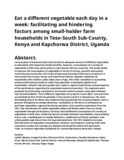| dc.contributor.author | Waswa, Lydiah | |
| dc.contributor.author | Jordan, Irmgard | |
| dc.contributor.author | Kretz, Eleonore | |
| dc.contributor.author | Itaru, Annet | |
| dc.contributor.author | Kossmann, Paulina | |
| dc.contributor.author | Alum, Daizy | |
| dc.contributor.author | Glas, Maria Gracia | |
| dc.contributor.author | Fischer, Sahrah | |
| dc.contributor.author | Mwonga, Samuel | |
| dc.contributor.author | Kabahenda, Margaret | |
| dc.contributor.author | Pircher, Thomas Pircher | |
| dc.contributor.author | Hilger, Thomas Hilger | |
| dc.date.accessioned | 2022-11-16T08:53:50Z | |
| dc.date.available | 2022-11-16T08:53:50Z | |
| dc.date.issued | 2022-04-01 | |
| dc.identifier.uri | https://conferences.egerton.ac.ke/index.php/euc/article/view/200 | |
| dc.identifier.uri | http://ir-library.mmust.ac.ke:8080/xmlui/handle/123456789/2119 | |
| dc.description.abstract | Consumption of balanced diets that include an adequate amount of different vegetables is associated with important health benefits. However, consumption of a variety of vegetables is often low, particularly in sub-Saharan African countries. This study aimed to improve the consumption of vegetables in terms of variety, quantity and quality. From February to October 2019 Trials of Improved Practices (TIPs) were carried out in Teso-South Sub-County, Kenya, and Kapchorwa District, Uganda, targeting 103 households with children under eight years of age. The trials’ included six counselling sessions with women aimed at improving vegetable consumption patterns of households. Tailored interview guides were used to capture experiences and perceptions of the participants regarding the negotiated improved practices. The responses were analysed by performing a qualitative structured content analysis using QDA-Software. The recommendation “Eat a different vegetable every day for seven days” was practiced successfully by 82% of the households in Teso-South and 67% in Kapchorwa. The main facilitating factors for those who implemented successfully the recommendation were a general willingness to change behaviour, availability on the farm or willingness to purchase vegetables, approval by family members, and a positive experience from the TIPs. The introduction of mixed-vegetable-dishes and dishes made from sun-dried vegetables through participatory cooking trials facilitated consumption of a variety of vegetables in both sites. Hindering factors included seasonal unvailability, inaccessibility due to cost, unwillingness to change behaviour, preferences of family members, and unfavourable experience from the improved practices. The TIPs helped to increase diversification of vegetable consumptions. However, participatory cooking trials with innovative recipes and tastings are needed and should be linked with agronomic trials to enhance vegetable availability for sustainable dietary behaviour change. | en_US |
| dc.language.iso | en | en_US |
| dc.publisher | Egerton University International Conference | en_US |
| dc.subject | Eat, different, vegetable, day ,week: facilitating, hindering, factors, small-holder, farm households | en_US |
| dc.title | Eat a different vegetable each day in a week: facilitating and hindering factors among small-holder farm households in Teso-South Sub-County, Kenya and Kapchorwa District, Uganda | en_US |
| dc.type | Article | en_US |

